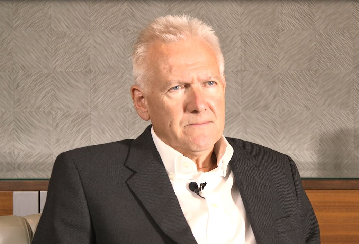Chairman of ASOS shares experiences from Amazon, IBM and ASOS
- 4 Min Read
Brian McBride, Chairman of ASOS and Former CEO of Amazon UK talked to HRD Connect about the lessons he has learnt from working with key disrupters like Amazon, IBM and ASOS. Jeff Bezos, Founder and Chief Executive Officer of Amazon recently highlighted the ‘disagree and commit’ principle – stating that as a manager you should […]
- Author: Unzela Khan
- Date published: Jun 1, 2017
- Categories

Brian McBride, Chairman of ASOS and Former CEO of Amazon UK talked to HRD Connect about the lessons he has learnt from working with key disrupters like Amazon, IBM and ASOS.
Jeff Bezos, Founder and Chief Executive Officer of Amazon recently highlighted the ‘disagree and commit’ principle – stating that as a manager you should be willing to be overruled, is this a principle you agree with and why?
Yes I do, and I thought it was one of the great parts of leadership culture at Amazon. I think you’re encouraged to speak up if you don’t agree with something; you’re encouraged to challenge it and argue the case. But there comes a point where if you don’t have a majority with you’ve just got to get behind the proposition. The worst thing you can do is say that you support something and then either by your words or your actions, your demeanour – you don’t support it. At Amazon, you’re very much brought into the fact that even if your argument didn’t win, you fully get behind the team and really work to execute what was agreed.
Having worked for some of the planet’s key disrupters, such as Amazon, IBM and ASOS – what single piece of advice would you give business leaders today?
I think business today is even more fast paced than when I was growing up and getting into my first executive position. What I would say to people is, recognise what’s going on around you, and you can’t plan either for you personally or for your company to stand still, so don’t hang out in the middle lane, You’ve got to get out there, you’ve got to accelerate and you’ve got to take risks.
Commonly, learning and development is the responsibility of the line manager – how much influence should HR have in the Learning & Development process?
Well I think HR is really a partnership. I mean HR have to steer the process, they have to create and provide the tools but they can’t make managers actually do it. So I think that they provide the framework but line management really have to get behind this and understand the importance of it and really recognise that it’s going to make their people even better.
How do you successfully move away from the traditional concept of a manager, to a more agile concept?
I think managing and leading are different but necessary attributes and it’s changing all the time, I think we talk about agility in every walk of life now but I think that some of the great leadership principles stand the test of time and it’s about being able to inspire, to organise, being able to get a group with you, because the group will achieve more as a group than it will as a sum of individual parts.
Is recruitment best when left solely to the HR department?
I think this is another case where it is very much a partnership, I think as a process that HR have to be involved in, quite often HR need to be the conscience and need to jog management along. I also think there’s an active role in the recruitment process that I certainly witnessed at Amazon and Dell and that is that the senior HR business partners are a very good custodian of the culture of a company, I think they can very often see that a candidate has got those right cultural attributes, or looks like a good cultural fit.









